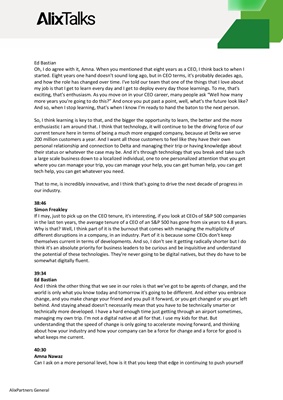
they've taken from others and are building and training on their own data, some of which they've
developed from scratch. And so, I think that depending on, as Michael said earlier, the sector and
the urgency, I think people will be looking at either buying or building, or a combination of the two,
sooner rather than later. I'll give you another example - I spoke to one of our private equity clients
recently, one of the very large private equity houses, who were doing deep diligence on a number of
major deals. They'd licensed from Microsoft a ChatGPT engine that could work behind a firewall, so
they could compare, they could use the engine within the data room on these diligences, as well as
synthesize the open source information as well. They'd done a number of deep diligence exercises
on deals that they'd already done, but ran this engine on the old data rooms to see what else the
engine would highlight that their own diligence hadn't. And in every case, according to this senior
partner, the ChatGPT engine under private license in the data room, had come up with at least three
material insights that none of their diligences had.
So, if you're a private equity house to this example, you want to have a model that works in a behind
the firewall environment. You really don't want to be building one yourself, you'll take a proprietary
one, maybe ChatGPT, or one of the others. And so, I think that for those that need to use these
engines urgently or see a real premium in moving to action quickly, then licensing an existing engine
to be used behind a firewall will be the priority, albeit in time they might develop their own as well.
For some other specialist businesses, I can imagine they will write their own.
So, one of the great opportunities, I think, for generative AI is in the development of medicines, the
development of treatments, and the speed at which generative AI can seemingly iterate different
use cases for medicines seems to be an extraordinary benefit for humankind, let alone for the drugs
industry. And so, I think that people will be using proprietary models for that. So, I think it's
somewhat use case dependent, but I think buy, build, and both is going to be on everybody's
agenda.
36:40
Amna Nawaz
Michael, anything you'd add to that in response to the audience question?
36:43
Michael Kratsios
No, I think that's right. I mean, when I fast forward a year or two years, most large enterprises, I
think, are going to have many tens of LLMs that are fine tuned to the particular use cases of the
company. And the base model that you use for those LLMs is probably use case specific. So, there's
some models that are essentially open source and free, and you can use those for certain use cases,
and they may be good. There are other more high stakes use cases where you want to use a more
expensive, cutting edge frontier model. So, there's a lot of actually interesting work being done on
trying to help companies identify which foundation model they want to use for their particular use
case.
37:22
Amna Nawaz
There's a number of questions coming in on the issues of oversight and company level regulation, if I
want to put those to you as well, because I think there's a lot of interest in this right now, as it is
uncharted territory. But Michael, let's start with you on this. One of the audience members is asking,